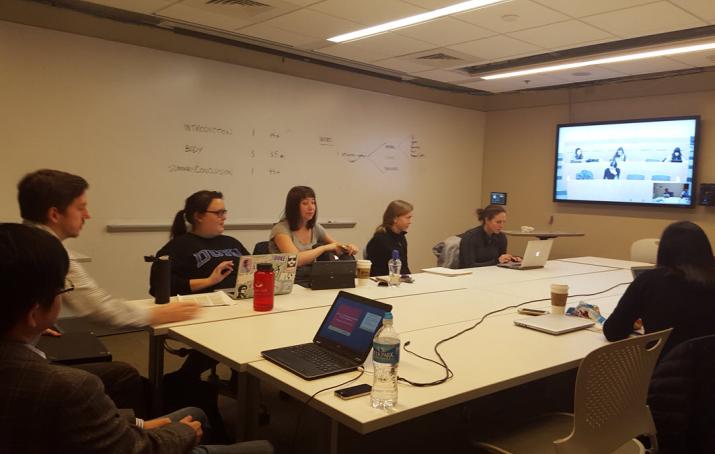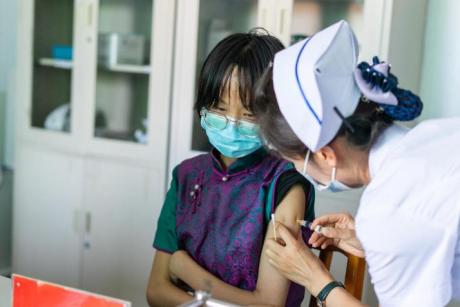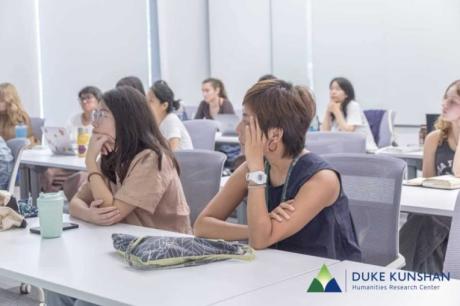
Durham, NC-based Master of Science in Global Health students attend DGHI professor Shenglan Tang's implementation science course from the Durham campus. They're joined via video by several students from Duke Kunshan University.
Published April 19, 2016 under Education News
This semester, professors at the Duke Global Health Institute (DGHI) have been using a range of technology-enabled teaching approaches to take their courses beyond the walls of a traditional classroom. Using innovative technology allows professors to offer their classes to students on the other side of the world, so that students from both Durham and Duke Kunshan University (DKU) can connect with each other and learn from the same faculty members.
Using Technology to Share Faculty
Global health professor Jeffrey Moe, who is based in Durham, is teaching a course called “Health Systems in Developing Countries” to students at DKU this semester. The course focuses on key challenges faced in strengthening health systems in low- and middle-income countries.
Moe teaches the class from a video conference-equipped classroom in The Link, a high-tech teaching and study space in Duke’s Perkins Library. In his classroom, Moe sees his DKU students on a large screen and what he is presenting on another screen. Audio from Moe’s classroom is streamed to the DKU classroom, and students each have a small microphone they can use when they want to contribute to discussion or ask questions, making it simple and natural to interact as a class.
Moe has two teaching assistants—Bolun Li, a Master of Science in Global Health (MSc-GH) student based in Durham, and Di Dong, a post-doctoral fellow based at DKU—whom he says have been instrumental in facilitating course logistics.
Moe taught at DKU the fall of 2015 semester and over Duke’s spring break, so he was able to get to know the students he is teaching. Moe said this prior face-to-face interaction has strengthened the class’s engagement level; he noted that other distance learning courses he has taught, where he never met students in person, were not as engaging.
Using Technology to Connect Students
Shenglan Tang, professor of medicine and global health, is also using a video conference-equipped Link classroom to teach “Developing Implementation/Operational Research for Improving Health Interventions.” In this graduate-level course, students study how to improve uptake, implementation and translation of research findings into routine and common practices.
Tang uses the same set-up as Moe, except his class includes ten students in Durham along with two enrolled DKU students and one DKU student who is auditing the course. The combination of Duke and DKU students in the classroom makes for interesting discussion and promotes cross-cultural communication, a skill essential to the field of global health.
Tang’s students—both in Durham, North Carolina and Kunshan, China—have embraced this course’s unique approach.
“As global health students, we frequently learn about the importance of working in collaboration with global partners and developing skills that allow for constructive conversation among diverse international parties,” said Durham-based MSc-GH student Jessy Guler. “I believe that the exchanges we’ve had in our course this semester embody these important attributes. This course has proven to me that technology can greatly assist in the process of conducting meaningful global conversations.”
And Anna Zhu, an MSc-GH student based at DKU, reflected, “Because of the technology, I feel like I’m sitting in the same room with our professor and other DGHI peers. It overcomes differences of time and region to extend high-quality, innovative education from DGHI to a remote area.”
Using Technology to Improve Accessibility
Another DGHI class, “Infectious Disease Epidemiology in Global Settings,” is being taught online by associate global health professor Wendy Prudhomme-O’Meara and assistant global health professors Gayani Tillekeratne and Matthew Rubach. Prudhomme-O’Meara is based in Kenya, Tillekeratne is based in Sri Lanka and Rubach is based in Tanzania.
Students taking this class view pre-recorded lectures online, then participate in a mandatory online group discussion. Additionally, students in both Durham and DKU come to a classroom once a week to participate in a WebEx discussion with professors and their “classmates.” Nine students based in Durham and two DKU students are enrolled in this course.
“The online medium provides a great opportunity for DGHI faculty based overseas to contribute to the teaching mission of the Institute,” said Rubach. “And my co-instructors and I hope that global health master’s degree students have benefitted from being able to interact with faculty who are out in the field.”


